| Reviews & Columns |
|
Reviews DVD TV on DVD Blu-ray 4K UHD International DVDs In Theaters Reviews by Studio Video Games Features Collector Series DVDs Easter Egg Database Interviews DVD Talk Radio Feature Articles Columns Anime Talk DVD Savant Horror DVDs The M.O.D. Squad Art House HD Talk Silent DVD
|
DVD Talk Forum |
|
|
| Resources |
|
DVD Price Search Customer Service #'s RCE Info Links |
|
Columns
|
|
|
Cary Grant: Screen Legend Collection
THE MOVIES:
Cary Grant is one of the most cosistent stars from the Golden Age of the Hollywood Studio System. Perhaps more than any other actor, he understood that what he was presenting to the public was an image. Quite famously, he has been quoted as saying, "Everybody wants to be Cary Grant. Even I want to be Cary Grant."
What this means for fans of the legendary actor is that when we sit down and watch one of his films, good or bad, we know what we can expect of Cary Grant. His long-lasting appeal is down to his striking good looks, his dashing poise, and a natural gift for both romance and comedy. Cary Grant can make you laugh even while he sweeps you off your feet.
The Cary Grant: Screen Legend Collection is a compilation of five of the films Grant made while under contract to the Paramount studios. Spread over three discs, these films were all shot between 1934 and 1936 and were the final building blocks that would lead him to become the internationally famous icon he is today. All of the movies here are romantic, most of them are comedies. Their quality varies, but as expected, Cary Grant is delightful in all of them.
Disc 1
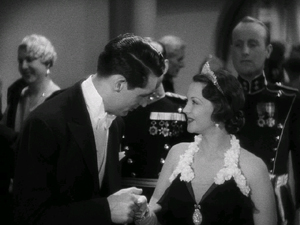
* Thirty Day Princess (1934): A surprisingly charming twist on the conventional "Prince and the Pauper" story. When a princess from a fictional European country comes to New York on a public relations mission to convince America to approve a loan to her kingdom, crusading newspaper man Porter Madison III (Grant) smells a rat. He thinks that Gresham (Edward Arnold, The Glass Key), the banker in charge of the transaction, is pulling a scam, and sure enough, Madison is right. He's just wrong about what that scam is. Princess Catterina has fallen ill with the mumps and struggling actress Nancy Lane has been hired to take her place.
Sylvia Sidney, who had starred with Grant twice before, is marvelous in both roles. In fact, she gets to show up her male lead by getting to play the haughty royal personage and then switch over to a street-smart New York girl. Naturally, the pair is going to fall in love, and her true identity is going to be an obstacle they'll have to leap in order to be together. What sets Thirty Day Princess apart from other films with the same plot is the chemistry between Grant and Sidney, as well as some amusingly oddball supporting characters and witty dialogue. Those two elements are most likely the product of Preston Sturges, who co-wrote the script and would later make a name for himself as the auteur behind many classic comedies. The ending may be the sappy one you see coming from a mile away, but it's the trip there that counts. If you know a restaurant out of town has your favorite meal, you don't complain when they serve it to you after you drive all the way there, do you?
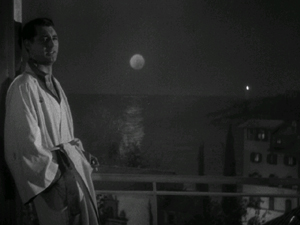
* Kiss and Make Up (1934): Cary Grant plays a pioneering plastic surgeon who runs a private spa for rich women who want to be beautiful. Blind to the affections of his "average" secretary, Anne (Helen Mack, The Son of Kong), he instead ends up chasing his most successful creation, the now completely synthetic Eve (Genevieve Tobin, The Petrified Forest). This naturally makes an enemy of Eve's soon-to-be-ex-husband Marcel (Edward Everett Horton, who also supported Grant in Holiday), who by a quirk of coincidence ends up with Anne. When the good doctor discovers that the woman he has sculpted is not all she was cracked up to be and sees the real deal slipping away, three guesses what he does.
Kiss and Make Up is entertaining, but a little bland. I couldn't help thinking the screwball situations could have been better in more assured comedic hands. A director like Howard Hawks could have really sped up the pace and made the situations sizzle. Cary Grant is very much in his element, strolling through a clinic populated entirely by women who are heels over head for his unique charisma. Though some of these shots are racy for 1934, they don't really have the lustful verve they could have. Women disrobing for Cary Grant's pleasure shouldn't be so staid! The climax is a madcap chase through town as Grant tries to stop Marcel and Anne before they get to the chapel. It involves multiple cars, broken bottles of ether, a baby carriage, and rapidly multiplying rabbits--and yet, it's the least exciting part of the movie.
One thing of note in Kiss and Make Up: Cary Grant sings two songs, something he doesn't do often. This includes a lonely, moonlit croon on a terrace above the French Riviera. (There are three songs in all, but they are kind of shoehorned in; this isn't a musical.)
Disc 2
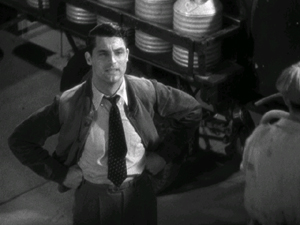
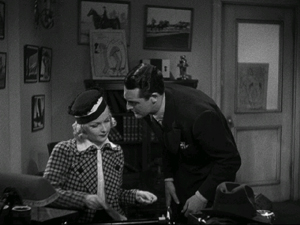
* Wings in the Dark (1935): The only non-comedy in the set, Wings in the Dark is a solid melodrama pairing Cary Grant with Myrna Loy. Playing aviator Ken Gordon, Grant gets a chance to show some vulnerability as an actor. Ken has been working on a way to fly "blind." His plane has all of its windows blacked out, and he operates the craft relying entirely on its instruments. The idea is that a pilot can get through any weather without having to worry about visibility. Loy is Sheila, a struggling female pilot reduced to doing carnival stunts to earn money. She is there when a freak accident causes Ken to go blind for real, and she tries to help him find his way back to doing what he loves. What better way to prove his system than to literally fly blind?
Naturally, things don't go smoothly. Sheila and Ken's assistant (Hobart Cavanaugh) try to shield Ken from a world that isn't going to stay hidden around the corner for long. The film takes a turn for the preposterous when Sheila gets lost on a transatlantic flight and Ken flies out to find her and lead her home, the ultimate victory for his ideas. It's a little hard to believe, what with impassioned and important speeches being shot back and forth across the radio while navigating a foggy skyline, but Loy and Grant play the scenes with the utmost sincerity and make it work. The film up until then is well done, anyway, and both actors fit in their roles well. It's a nice balance to see Grant struggling with his blindness, dealing with the fear and anger inherent in such a life-altering change. For all of its pretty wrapping at the end, not a bad picture.
* Big Brown Eyes (1936): Raoul Walsh, who would go on to great success with other icons like Humphrey Bogart and James Cagney, helms a Damon Runyon-esque New York comedy where Cary Grant plays a hunky cop on the trail of some jewel thieves. Joan Bennett plays his fiancée, a girl who goes from manicurist to newspaper reporter and back again to help her handsome detective get the scoop. The story has some dark turns, what with one of the middlemen in the jewel scam accidentally shooting a baby, but the plot takes a backseat to the Grant and Bennett romance. She makes a good foil for the actor. By this point, he's settling comfortably into the suave persona that would define the Cary Grant name, and he needed lead actresses who could play tough and independent, matching him wisecrack for wisecrack. Bennett is able to wrap Grant around her finger in much the same way Rosalind Russell would later in His Girl Friday.
For the most part, Big Brown Eyes is an amusing trifle. The villains (Walter Pidgeon and Lloyd Nolan) make no bones about being pretty bad guys, and it's easy to root for the two lovers to bring them in. Some of the storytelling is clumsy, however, and there is a particularly weak scene where Grant's character is supposed to be using his ventriloquist skills to trick Joan Bennett. The woman's voice we are to believe he is mimicking is so obviously dubbed in, you'd be better to close your eyes and imagine it's a real conversation. Much funnier is when Bennett does the same thing moments later to make fun of him, only she actually performs the voices. Her exaggerated tones when impersonating both the male and female speakers are quite funny, and the laughs are egged on by Grant's constant frustration with Bennett's constant annoyance with him and life in general.
Disc 3
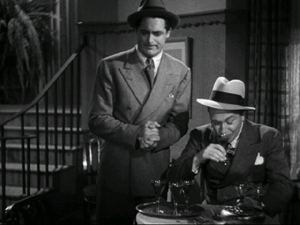
* Wedding Present (1936): The final disc only has one movie, the last Cary Grant made for Paramount, and another with Joan Bennett. As dueling reporters in love, this pairing once again anticipates His Girl Friday. Charlie and Rusty are the best reporters in Chicago, so it makes sense they would fall in love and want to get married. Only, Charlie can't stop clowning around, and the Justice of the Peace closes before they can seal the deal. Fed up, Rusty swears they will never step up to the altar again. It seems to be business as usual from there, with the duo stumbling into news even while they are pulling pranks on their unsuspecting editor. When they finally drive their helpless victim out of his post, Charlie takes the job and lets the power go to his head. Annoyed by this change of events, Rusty leaves for New York, where she becomes engaged to a boring self-help author (Conrad Nagel).
Naturally, Charlie is going to figure out what he has done wrong, and as funny as this screwball comedy was back in Chicago, it really takes off in New York. To win Rusty back, Charlie enlists a gangster who owes him a favor. Smiles is played by William Demarest, known as one of Preston Sturges' company and also Uncle Charlie on TV's "My Three Sons." I love William Demarest, and he doesn't disappoint in Wedding Present. A night on the sauce inspires the very drunk pair of Charlie and Smiles to deliver the greatest wedding present a girl with a nose for news could ever want. It's incredibly silly, but also a giddy thrill.
***
All of the movies in the Cary Grant: Screen Legend Collection are B-movies, make no mistake. They are bundled here because no one is really clamoring for them on their own. If you like Cary Grant, however, then you will enjoy seeing him honing his craft just prior to his big breakout. The movies that work best are Thirty Day Princess and the two with Joan Bennett, and those are enjoyable because they are fluffy romantic comedies that pair Grant with the right actresses. It's essential that a couple works on screen if the audience is going to buy them falling in love. Perhaps this is the biggest problem in Kiss and Make Up, the one C-grade movie in the bunch, even more so than the failures of the story line. Even in the lone drama, Wings in the Dark, a lot of the movie succeeds because Myrna Loy fits well in Cary Grant's embrace.
THE DVD
Video:
All the movies in the Cary Grant: Screen Legend Collection are black and white and in full frame (1.33:1). The transfers are passable. They aren't fully restored, and so sometimes the images can be a little soft and there are occasional scratches. They are really just average prints, probably given limited attention because these are less-famous features put together as a low-priced set.
Sound:
All of the soundtracks are a little bit fuzzy. You can hear everything and understand the dialogue fine, but the audio elements contain some low-level distortion. They are presented in Dolby Mono 2.0. There are optional subtitles in English and French.
Extras:
None. Not even trailers or chapter menus, the old special feature standbys.
The DVDs are in a foldable cardboard sleeve and slipcase. The sleeve is decorated with photos and facts about each film.
FINAL THOUGHTS:
Classic movie buffs will enjoy seeing these B-grade films that don't get shown all that often, and Cary Grant fans will want to see the star transitioning from bit player to full-on movie star. Though the Cary Grant: Screen Legend Collection isn't given the reddest of red carpet roll outs, it's an affordable set that manages to give its entertainment value. Recommended.
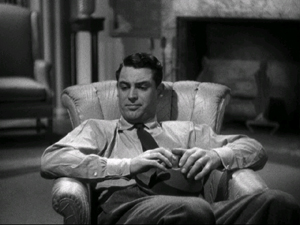
Jamie S. Rich is a novelist and comic book writer. He is best known for his collaborations with Joelle Jones, including the hardboiled crime comic book You Have Killed Me, the challenging romance 12 Reasons Why I Love Her, and the 2007 prose novel Have You Seen the Horizon Lately?, for which Jones did the cover. All three were published by Oni Press. His most recent projects include the futuristic romance A Boy and a Girl with Natalie Nourigat; Archer Coe and the Thousand Natural Shocks, a loopy crime tale drawn by Dan Christensen; and the horror miniseries Madame Frankenstein, a collaboration with Megan Levens. Follow Rich's blog at Confessions123.com.
|
| Popular Reviews |
| Sponsored Links |
|
|
| Sponsored Links |
|
|
| Release List | Reviews | Shop | Newsletter | Forum | DVD Giveaways | Blu-Ray | Advertise |
|
Copyright 2024 DVDTalk.com All Rights Reserved. Legal Info, Privacy Policy, Terms of Use,
Manage Preferences,
Your Privacy Choices | |||||||














